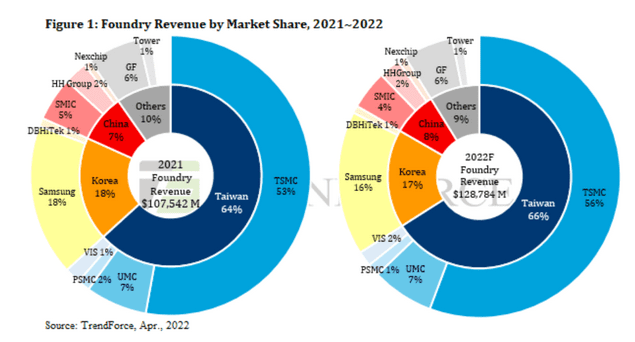A recent report by the Taiwanese research institute revealed that Samsung foundry’s market share is expected to decrease by two percent this year. According to the research, the South Korean electronics giants will experience a slight drop in their market share due to more competition from Taiwanese foundries, the like as TSMC, UMC, PSMC, and VIS which are among the best in the industry.
With 53 percent of the market share last year, TSMC maintained its lead. UMC came in second with 7%, PSMC came in second with 2%, and VIS came in third with 1%. Samsung Electronics, with 18 percent of the market, maintained its position as the world’s second-largest foundry.

However, the market share difference between Samsung and TSMC is expected to increase even further this year.
According to the analysis, TSMC’s market share will increase by 3 percentage points to 56 percent in 2022, up from 16 percent in 2021, while Samsung’s market share will fall by 2 percent to 16 percent.
Similarly, by the last quarter of the year, Nvidia plans to announce the RTX40 GPUs, which are 5-nm devices, and the successors of the RTX30 GPUs due in September 2020. Samsung Electronics’ 8-nm manufacturing technology was used to manufacture the whole RTX30. When it comes to the new product, there are claims that Nvidia will collaborate with TSMC to achieve a 5-nm yield that is higher than Samsung Electronics’.
According to industry sources, Nvidia is paying a $9 billion advance, with the remaining $1.8 billion due in the first quarter of this year. Qualcomm, another important client, isn’t as close as it once was. Last year, Intel re-entered the global foundry industry, and it just announced partnerships with Qualcomm and Amazon.
Intel and Qualcomm are expected to begin working together on 2-nm technologies in 2024. Samsung Electronics has collaborated with Qualcomm to compete with TSMC, the only manufacturer that supplies Apple with application processors. Samsung Electronics is taking a risk by collaborating with Intel and Qualcomm in these circumstances.
Despite the fact that the South Korean electronics giant is still the runner-up in the foundry business and collaborates with Tesla, Google, and IBM, it cannot catch up to TSMC without the help of Nvidia and Qualcomm, as it is finding it difficult to get new customers on board.




